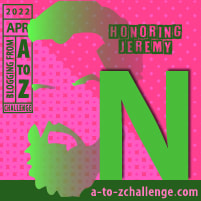Let me be clear, for most of my oldest son’s life we pursued just the right diagnosis or classification in order to get him the help he needed to be successful in an education system that more often than not did not understand or appreciate him. I’m not sure we ever succeeded. We did get him into a school that understood him for who he was and offered him the “special” education he needed in order to be academically successful, so that was a good thing.
Along the way he had some really great teachers in both general and special ed – teachers who sincerely cared about him as a child and a learner, who were willing to take the time to find ways to be with and support him. Teachers who met him where he was, which had less to do with whether they saw him as "neurodivergent" or not and much more to do with whether they were able to appreciate who he was.
In the end the best term that captured the essence of this boy was “a complex child who defies categorization.” This from the developmental pediatrician we waited 6 months to see – this which didn’t lend itself to any services. Even when we did have a diagnosis and hired a doctor and advocate to present it to the school team, some teachers still didn’t believe it – they still blamed him for his behaviors and lack of attention. They hung onto the notion that “if he’d just try harder, he could do better.”
In retrospect, I look at our journey of exploration and seeking labels and support through his eyes and imagine he must have felt like a problem or puzzle to be solved. Ugh… I hate that I didn’t know better than to do that to him, even though we were loving and supportive the best we could, trying to understand him so that he could get the best help. I’m afraid all of this poking and prodding, medication attempts, and sessions with various specialists gave him a bunch of mini traumas and a sense of not being ok as he was. It made him look and feel different, like he didn’t belong.
Why can’t all kids have the “special” education that they need to help them succeed and be engaged, excited learners? That’s my big dream. I know we’re not there yet. My last job was as Director of Parent Training Information Center for New York, overseeing programs that supported parents of kids with special needs navigate special education and advocate for their children’s educational needs. I understand the importance of these programs, and I wish they weren’t necessary. I wish kids didn’t need to be taken to a separate room or school to learn, excluded and isolated from other peers where they would all benefit from sharing space and time.
My wondering about this term “neurodivergent” comes from believing that every single one of us is as unique as a snowflake in how we think and function. Why do we need to group people into “typical” or “standard” and “divergent?” Why separate us into different categories?
In doing a little research, I found this article which says, “ Neurodiversity is the idea that it's normal and acceptable for people to have brains that function differently from one another. Rather than thinking there is something wrong or problematic when some people don't operate similarly to others, neurodiversity embraces all differences.”
Ok, somehow “neurodiversity” lands more favorably on my ears and heart than “neurodivergent” does. Diversity signals a welcoming of difference, an acceptance, and inclusion. Divergent sounds separating. Isn’t that interesting?
Divergent:
So, I looked up these words! Merriam-Webster defines divergent this way: 1a: moving or extending in different directions from a common point: diverging from each other; b: differing from each other or from a standard. Emphasis on moving in different directions and differing.
Diversity:
Diversity, on the other hand, is defined by Merriam-Webster as: 1: the condition of having or being composed of differing elements: VARIETY especially: the inclusion of people of different races, cultures, etc. in a group or organization.
So, neurodiversity I’m down with! Let’s celebrate and include all the brains and all the ways of thinking and being.
“Being different isn’t a bad thing. It means you’re brave enough to be yourself.”
– Luna Lovegood
(and, yes, I am indeed quoting Harry Potter characters!😊)
My dream is a world that accepts the reality that people are remarkably diverse and have different needs for learning, socialization, and support; different ways of showing up and expressing themselves. In my dream world each person is seen and valued for who they are as a person, and they are accepted for the gifts and talents they bring, whether they develop or think “typically” or not. I long for the day when each child is allowed to learn in their own way and at their own pace and not forced into a box that doesn’t fit. I would love to see each person be seen, heard, and valued for the energy they have, the way they process and express, and the way they desire to interact with the world.
Talk to me! Especially if you identify yourself or a loved one as neurodivergent. I know this post might be provocative. And, I hope that you will hear my questions as coming from a place of true curiosity, a willingness to hear and consider your point of view, and a genuine respect for a topic that feels worthy of contemplation. Thanks for taking the time to read and reflect.


 RSS Feed
RSS Feed